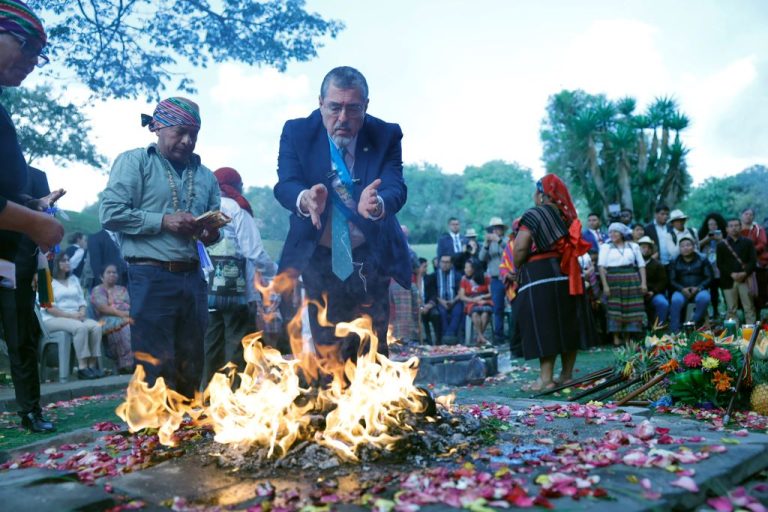23 de enero 2024

“NicaraguAmor” Cultural Caravan for Nicaraguans in the USA

PUBLICIDAD 1M
PUBLICIDAD 4D
PUBLICIDAD 5D
The elite counterattack, the president’s “Semilla” party forms a coalition in Congress, and the US levels sanctions against ex-President Alejandro Giam

Bernardo Arevalo de Leon, Guatemala’s new president, participating in a Mayan ceremony led by spiritual guides from the four regions of Guatemala. Photo: David Toro / EFE
On Monday January 15, Bernardo Arevalo, Guatemala’s new president, received the Guatemalan Army’s Vow of Submission to the civil powers. Through this ceremony, an institution that has promoted coup d’etats throughout the country’s history committed itself to serving as a bastion of stability for the regime and the defense of the democratic system.
This year, the ceremony was held publicly in Guatemala City’s Plaza of the Constitution instead of in a military base as during the three preceding regimes. Witnessing it, many of us Guatemalans thought that the attacks against the electoral results and the president’s Semilla Party had perhaps ended.
Unfortunately, shortly afterwards we were reminded that the outgoing regime and its allies still control key government institutions that can limit the scope of the new government’s actions. This was brought home by a Constitutional Court order for provisional protection, awarded to a group of political figures who lost the elections for the Congressional Governing Board, and for entities that have questioned the results of the presidential elections.
One of those petitioning the Court for protection was Sandra Jovel, a deputy for the Valor Party who aspires to preside over Congress. Jovel was Minister of Foreign Relations during the Government of Jimmy Morales [2016 – 2020] and an important figure in the campaign to expel the International Commission against Impunity in Guatemala (CICIG) from the country.
Jovel’s bid for Speaker was backed by ex-President Alejandro Giammattei’s Vamos Party and the UNE Party of Sandra Torres [defeated presidential candidate], and her victory was considered nearly a given. Nonetheless, the Semilla parliamentary group cobbled together a coalition of 92 deputies, a majority of the 160 that make up the Guatemalan Congress.
The Court’s granting of protection also ratified the suspension of Semilla’sstatus as a political party which a criminal court had decreed, along with an order to repeat the elections. The order itself is currently being litigated. The ratification of Semilla’s suspension prevents its deputies from forming a parliamentary group, holding positions in the legislative power’s leadership, and presiding over commissions as president.
This decision of the Constitutional Court can be interpreted as the Status Quo’s defensive play. After Semilla’s victory in Congress, these key figures expressed their alarm at the possibility that the government of Bernardo Arevalo could promote reforms that alter the economic game and the real balance of power.
Semilla, together with its allies, has committed to promoting a Law of Competition and a Water Law, two measures that would affect the privileges of large economic groups and would give the Arevalo government the power to eliminate the privileges and protections that block the emergence of new companies and limit the use of water in the entire country.
The Constitutional Court’s ruling was a warning salvo from the business elites and a reminder to the incoming government of the weight that these elites still wield in decision-making, a power they’re not willing to cede. It was also a reminder of the control that the so-called “Pact of the Corrupt” maintain over the key government institutions.
Nonetheless, in a very intelligent move on the part of Semilla and its allies, they called a press conference on Thursday January 18, to announce they would comply with the court order despite its being illegal and revealing a clear intent to destroy them as a political organization. The press conference was presided over by Samuel Alvarez, the new president and visible head of the coalition, accompanied by a group of deputies that back him, in a demonstration of power that amounted to a new victory of the coalition against the alliance made up of Giammattei’s followers, the Valor Party and that of Sandra Torres.
The apparent strengthening of the coalition that Semilla leads was likely influenced by the US government’s decision to cancel the US visa of outgoing President Alejandro Giammattei. The statement issued by the US State Department indicated that the decision was because he “accepted bribes in exchange for the performance of his public functions.” The measure also extended to his three children. At the end of November, the United States canceled a great number of visas of Guatemalan political functionaries, including 100 deputies from the former Congress, and prominent members of the business elites. The measure taken against Giammattei and his children was a reminder of the importance the US places on avoiding the deterioration of democracy and the proliferation of corruption.
On Friday, January 19, there was a new election in Congress, and the group backed by Semilla won with many more votes than it obtained in the first round. This time, instead of 92, it was backed by 115 votes, although the Semilla deputies themselves have been barred from participating in this leadership structure. It’s clear that symbolic actions like the Army’s Vow of Submission and the victory of the parliamentary coalition headed by Semilla are no guarantee that Guatemala’s political tempest will subside. Everything appears to indicate that those fighting for the Status Quo will continue their battle to retain power and use all their weapons to block the new government.
This article was published in Spanish in Confidencial and translated by Havana Times. To get the most relevant news from our English coverage delivered straight to your inbox, subscribe to The Dispatch.
PUBLICIDAD 3M
Periodista y sociólogo guatemalteco. Ha sido reportero, editor, columnista y director de medios. Ha realizado investigaciones sobre las interacciones entre los medios y el sistema político. También ha sido catedrático a nivel de pregrado y posgrado sobre teoría social, comunicación y periodismo. Director a la Asociación Desarrollo, Organización, Servicios y Estudios Socioculturales (DOSES).
PUBLICIDAD 3D